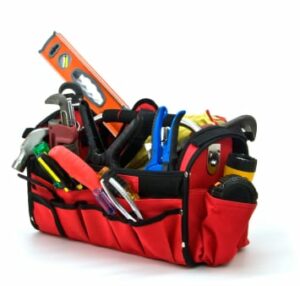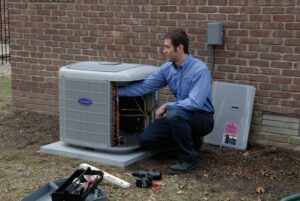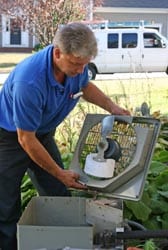I have a friend who’s a real serious DIYer. I own a business in the trades, and I can say, she knows her way around a toolbox. She asked me the other day about getting her central air conditioner ready for summer. She’d done her homework online by watching several DIY YouTube videos last fall on covering her air conditioner for winter. She followed through on what she learned, and her exterior unit made it through the winter in good shape.
Now that she’s thinking about getting it going again, her question to me is: “Why am I going to pay someone to do what I can do myself?”
She asks a reasonable question, and I’m going to answer it by covering the 4 tune-up tasks every air conditioner needs in the spring, along with the hidden traps for DIYers.
1. Comply With the Equipment’s Factory Warranty.
If your central air conditioning system has a warranty, there are many clauses that void the warranty. The same goes for furnaces, boilers, heat pumps, and ductless mini-splits. To be clear, register all brand-new HVAC equipment immediately after installation so you don’t forget.
Other common warranty conditions include regular maintenance and inspections by a manufacturer-certified HVAC technician and exclusively using replacement parts made by the original manufacturer.
The Trap: Your warranty voids without professional service.
In my friend’s case, her central air unit came with the house and the manufacturer’s warranty has expired. If you’re in the same position, keep reading.
2. Check Your Charge and Draws.
It’s important to check your refrigerant charge because too much or too little refrigerant makes an air conditioner less efficient and can shorten the life of the equipment, according to ENERGY STAR. Refrigerant isn’t used up so if you have to add more, there’s a good chance a leak exists somewhere.
The Trap: It’s illegal to handle refrigerant without a license from the Environmental Protection Agency, according to Dave, a certified HVAC technician from HVACTraining For Beginners.
PRO TIP: If you find your evaporator coil frozen, you may have low refrigerant.
Dave also recommends taking amp draws on the compressor common wire, fan motor, and indoor blower motor to compare the readings with the spec numbers on the nameplate. This requires a confident DIYer who doesn’t mind working in an electrical panel and using an amp meter.
3. Clean the Condensate Drain Line and Pan.
One of the most common reasons homeowners need an a/c repair technician is due to a clogged condensate drain line. This is very important to check because with a clog, the water typically leaks back into the house and causes costly damage, says Dave.
Like the drain line, the drain pan holds water and can breed the same mold, bacteria, and gross slime that clogs the drain line. Cleaning the pan is usually easy.
The Trap: Unclogging a drain line requires the DIY confidence to locate the end of the condensate drain line on the exterior of the house and use the proper attachment to suck the clog out with a wet/dry vac.
PRO TIP: You may find advice online to pour a mixture of water and vinegar down the condensate drain line regularly to keep it clear. Many manufacturers advise against doing that with the latest central conditioning equipment, according to an HVAC technician on Neighborly.com.
4. Clean the Condenser Coils.
Unlike evaporator coils that must be cleaned with a special no-rinse foam, the condenser coils can be cleaned with a garden hose and spray nozzle, according to Don Vandervort from HomeTips. He cautions handy homeowners to turn the power off to the condenser and thermostat before spraying.
The Trap: To do a good job, the fan needs to be removed from the motor so the built-up “gunk” can be sprayed from the inside out of the equipment, Don says. Doing this task on your own (if you’re not a factory-certified HVAC technician) can void your warranty and damage your unit.
Conclusion:
For most DIYers, do your part to keep your HVAC equipment running efficiently by checking the filter once a month, cutting back vegetation growing over your exterior equipment, and making visual inspections of the equipment between regular service appointments.
Count on experienced and talented heating and cooling experts to handle the rest.
Phil
CPS Heating and Cooling
You can always call on your extended family of dependable heating, cooling, and air quality experts at CPS Heating & Cooling.
Contact us anytime to set up a consultation or call us at (508) 501-8848.





